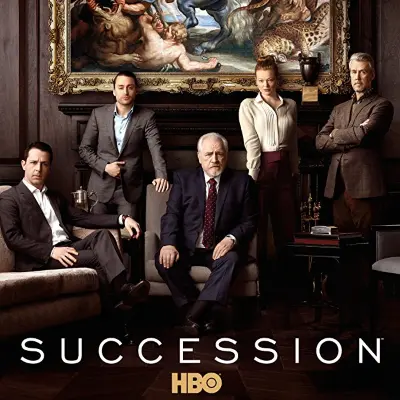Succession's ridiculous banter doesn't get enough credit for making the show great
-

"It’s a cliché by now to note that Succession lives between comedy and drama," says Spencer Kornhaber. "What’s harder to talk about is the way that the tonal specificity of the show is maintained through the serious-silly dialogue. The characters themselves are highly aware of their lives as drama. It’s a heavy situation they’re in, after all: battling for control of a global organization so powerful that it has a body count, led by a man who would sacrifice his own son. This drama, the characters realize, is stuff of the Greeks and Shakespeare but also of Mamet and Sorkin. They’ve read the myths; they’ve absorbed their rhetoric; they’ve put their spin on it. But within the world of the show, these characters are not poetic heroes created by accomplished writers. They are just pretentious humans with foot fungus. They are dorks who yell things such as, 'The early bird gets the best cabin!' (Connor, played by Alan Ruck) or, 'Did you, like, build a glider out of a Caesar salad?' (Tom). Succession’s weird realism comes from the halfway-profundities and failed jokes and borrowed small talk of characters who don’t know exactly what they’re trying to say and who are terrified of revealing their true natures. The finale crystallized the show’s acidic insights about how and why people natter."
ALSO:
- Succession has mastered the hour-long drama by making each episode a self-contained explosion: "Lots of TV series have tried similar slow-burn strategies, and, especially within the past several years, the results have tended to range from mild disappointment to spectacular failure," says Kathryn VanArendonk. "It’s Hang On Until Episode 8 When It Gets Good Syndrome, the thing that happens when a show is too focused on kicking the can down the road, promising that delayed gratification will be better than immediate pleasure. You could also call it Ozark Syndrome, or House of Cards/Man in the High Castle/Daredevil Syndrome. It is generally but not exclusively Streaming Drama Syndrome, an issue that plenty of non-streaming series have also suffered from. (Game of Thrones, here’s looking at you!) The thing Succession has figured out, the structure that inoculates it from boggy, “you can only appreciate it when you see the whole season” storytelling, is that Succession builds an episode better than any hourlong show on TV right now."
- Succession mirrors how mediocrity combined with ruthlessness can lead to success in America: "Succession is the perfect show for the era of Donald Trump, because it's a show exposing the lie that is the myth of the American meritocracy," says Amanda Marcotte. "In its highly stylized and darkly hilarious way, Succession plugs right into the current American moment, where we're coming to the collective realization that the wealthy class that controls so much of our politics and our society is a bee's hive of morons who are simply coasting on luck, privilege, and a system that favors the wealthy at the expense of everyone else. And, if anything, the worst among us are actually best positioned to succeed in our deeply broken social systems."
- Media have a masochistic love affair with Succession: "Throughout Succession's recent season, every Sunday night, media Twitter lit up the timeline with wry jokes, memes, and references to the latest episode, particularly those most relatably scathing to our chosen industry: the ever-shifting hellscape known as digital media," says Alex Zaragoza. "While the show isn't a ratings juggernaut in the vein of Game of Thrones, its finale, which aired this week, pulled in 1.1 million viewers. But looking at Twitter, it felt like 900,000 of those viewers were New York-based media professionals. Granted, if you reside within the echo chamber of the industry, that effect will happen. This all begs the question: Who's watching Succession besides navel-gazing media professionals?"
- Attempts to “solve” Succession’s season 2 finale misunderstand what makes the show so good
- No TV show has ever weaponized figurative language as well as Succession
- Succession costume designer Michelle Matland and her assistant Jonathan Schwartz discuss the deeper meaning of their outfits
- The season finale's yacht clothes were especially interesting
- J. Smith-Cameron on watching the Season 2 finale: "A lot of stuff that we’d shot was missing"
- L'Succession: The L Word meets Succession in fan mashup
- The word "f*cking" was uttered 283 times in Season 2, while "f*ck" was mentioned 238 times
TOPICS: Succession, HBO, The L Word, Jonathan Schwartz, J. Smith-Cameron, Michelle Matland, Costume Design
